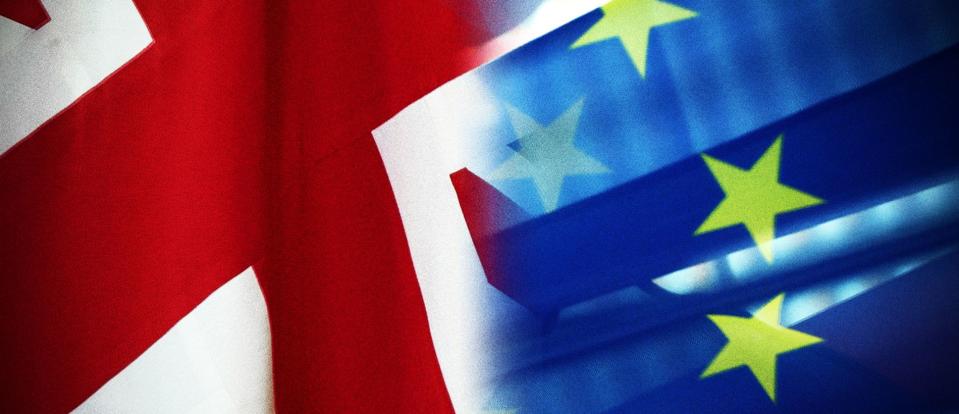Brexit Bulletin: Where It Matters Most
(Bloomberg) -- Sign up here to get the Brexit Bulletin in your inbox every weekday.
What’s Happening? The places that put Prime Minister Boris Johnson into power are most at risk from the hardest of Brexits.
Away from the political centers of the U.K. and Europe, where politicians and negotiators will argue over the post-Brexit settlement, actual communities will soon need to adapt to whatever future relationship is (or isn’t) eventually agreed.
Johnson has already taken a tough stance, saying he would be prepared to accept significant tariffs and trade barriers. Yet a glance at the electoral map shows he would be gambling with his own future if he follows through with that threat.
The Conservatives won power last December by convincing people in traditionally Labour-supporting industrial districts to vote Tory, some for the first time in their lives. As Bloomberg’s Joe Mayes and Sam Dodge make clear today, locals in those districts still rely overwhelmingly on the manufacturing jobs that would be at risk if Britain fails to secure a free-trade deal.
Read the Full Piece: Where a Brexit Trade Deal Matters Most to Boris Johnson
In 36 of the seats Johnson’s Tories won from Labour in 2019, manufacturers employ more people than the Tory majority. If each of those districts returned to Labour at the next election in 2024, and all else remains equal, Johnson’s majority would be slashed.
Yet with voting season now underway in the U.S. (sort of) it’s worth noting what’s playing out across the Atlantic. Although President Donald Trump’s trade war with China may be easing slightly, U.S. farmers waiting for a Chinese buying spree have been badly hit by the impasse. Nevertheless, as Trump prepares to deliver his election-year State of the Union address, Gallup puts the president’s approval rating at 49%, a personal best.
We’re a long way from another election. But Johnson appears to share with Trump an ability to convince disenfranchised voters to back them in the face of political orthodoxy. If Trump wins re-election and the post-Brexit waters turn choppy, the prime minister may need to follow the president’s lead.
Beyond Brexit
No city hates its landlords like Berlin does. Who’s up for expropriating some private property? Imported avocados beats native beef, every time. It’s time to banish “eat local,” say Bloomberg’s Akshat Rathi. One traveler circled the world in 37 hours while the coronavirus reshaped international law around her.
Brexit in Brief
Into the Lead | Sinn Fein, the former political wing of the Irish Republican Army, moved into the lead ahead of Ireland’s Feb. 8 general election, a poll showed. Prime Minister Leo Varadkar’s Fine Gael fell to third place.
Divergent Views | People who voted Leave in 2016 do not believe the U.K. should insist on its own regulatory regime after Brexit, but want certain standards maintained after transition, a new survey has found.
What Next? | The U.K. government faces a host of challenges after Brexit, according to the UK in a Changing Europe thinktank. Several key policy planks will need to be refashioned, with the structure of the economy and the future of the Union on the agenda as well as trade talks, it says in a new report.
Stars Align | It’s time for Britain to get productive about solving its productivity crisis, says Bank of England policy maker Andrew Haldane. A “rare opportunity” has arisen to elevate the long-running issue to the top of the national agenda, he said.
Building Up | The U.K.’s beleaguered construction industry got some relief last month: IHS Markit’s index of building activity rose to 48.4, from 44.4 in December, although it spent ninth months running below the threshold that signals expansion.
Brexiball | The world’s most popular soccer league faces an uncertain player transfer market and concerns over assets held in British pounds after Brexit, the Wall Street Journal reports.
‘Good Riddance’ | The European Union figure charged with bidding farewell to the U.K. wished her British counterpart “good riddance” instead of “good luck,” the Financial Times reports. The comment was a genuine linguistic mistake, the newspaper says, and was taken in good humor by the outgoing U.K. ambassador, Sir Tim Barrow.
Want to keep up with Brexit?
You can follow us @Brexit on Twitter, and listen to Bloomberg Westminster every weekday. It’s live at midday on Bloomberg Radio and is available as a podcast too.
Share the Brexit Bulletin: Colleagues, friends and family can sign up here. For full EU coverage, try the Brussels Edition.
For even more: Subscribe to Bloomberg All Access for our unmatched global news coverage and two in-depth daily newsletters, The Bloomberg Open and The Bloomberg Close.
To contact the author of this story: Adam Blenford in London at ablenford@bloomberg.net
To contact the editor responsible for this story: Chris Kay at ckay5@bloomberg.net
For more articles like this, please visit us at bloomberg.com
Subscribe now to stay ahead with the most trusted business news source.
©2020 Bloomberg L.P.



